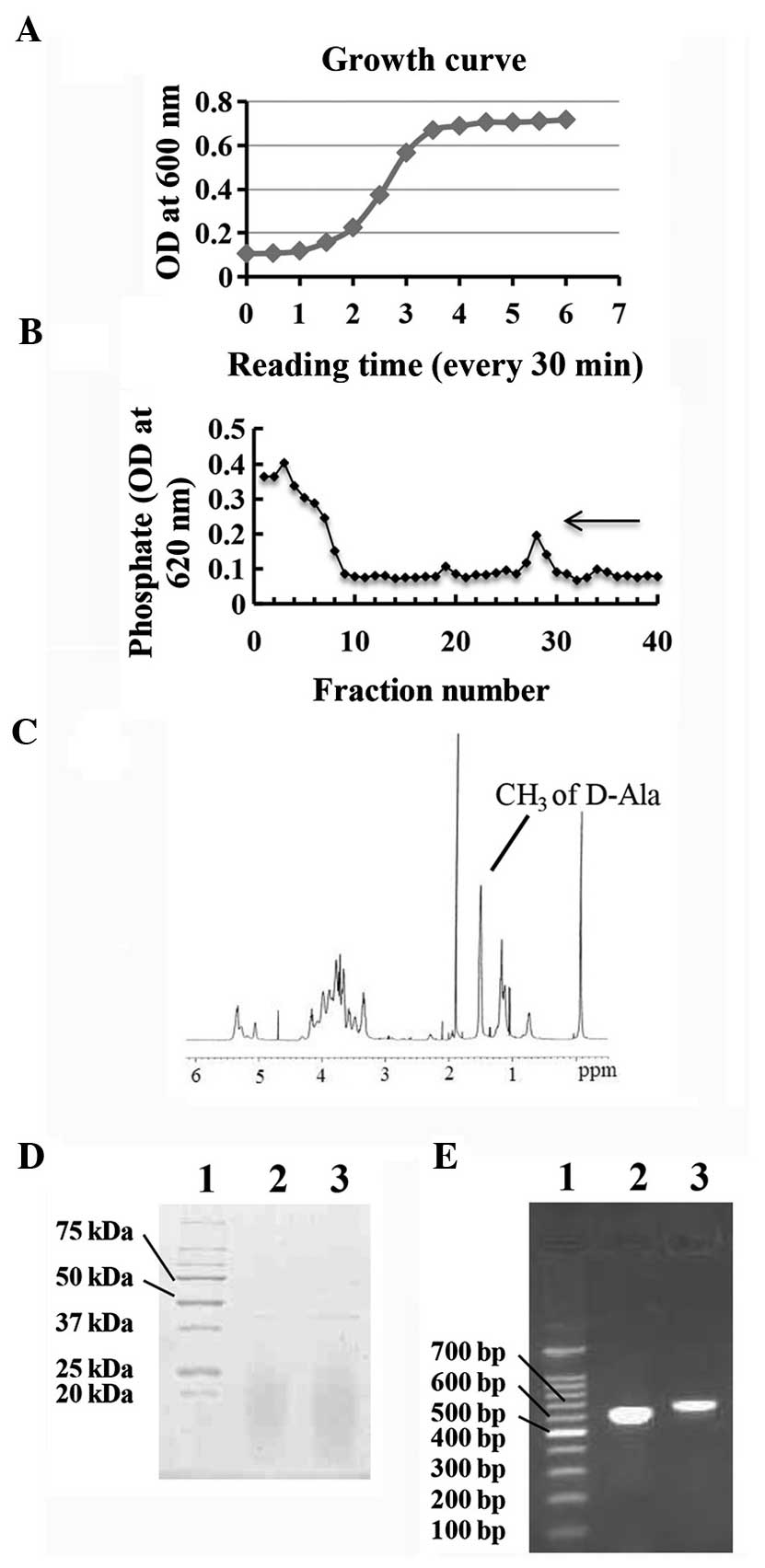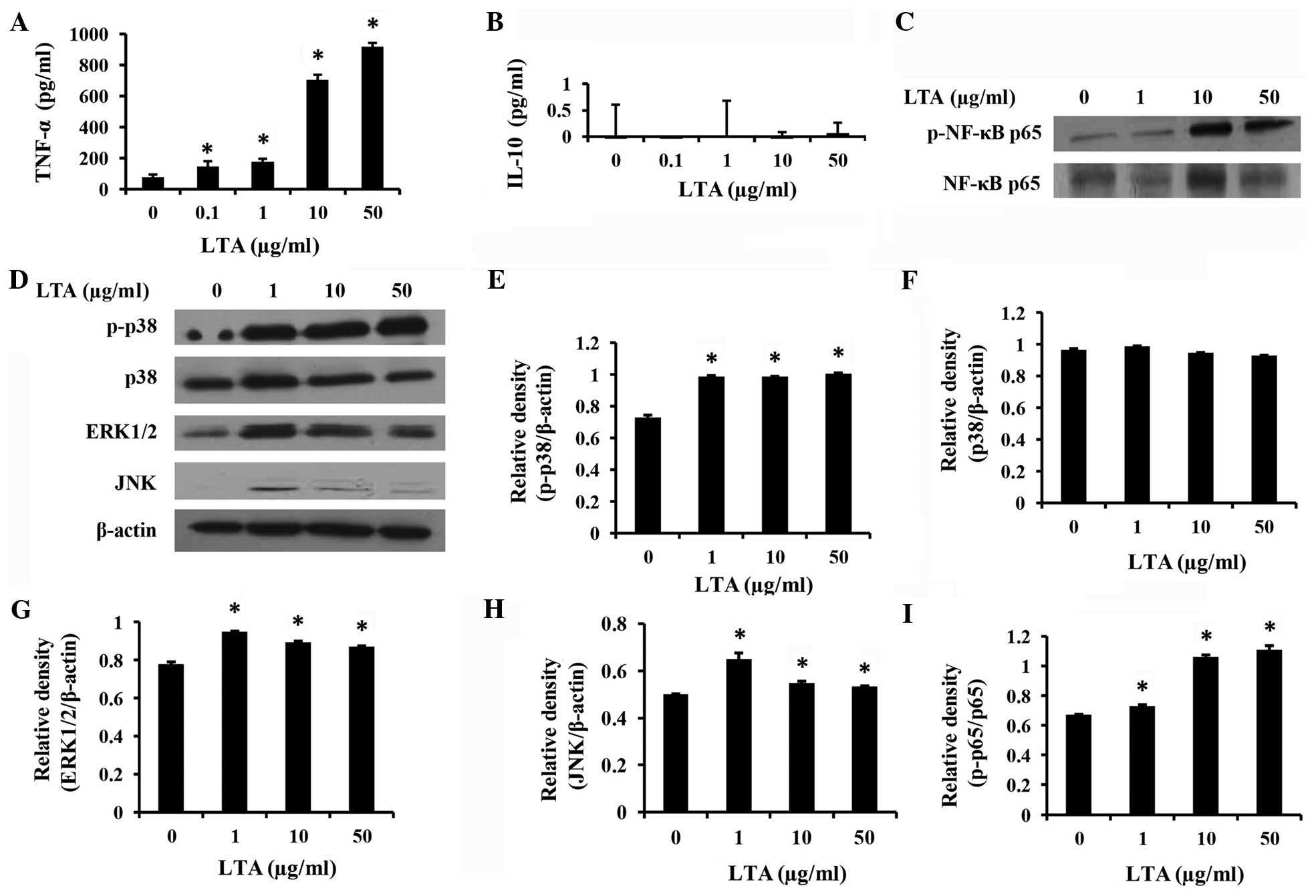|
1
|
Jones ME, Draghi DC, Thornsberry C,
Karlowsky JA, Sahm DF and Wenzel RP: Emerging resistance among
bacterial pathogens in the intensive care unit - a European and
North American Surveillance study (2000–2002). Ann Clin Microbiol
Antimicrob. 3:142004. View Article : Google Scholar : PubMed/NCBI
|
|
2
|
Rôças IN, Siqueira JF Jr and Santos KR:
Association of Enterococcus faecalis with different forms of
periradicular diseases. J Endod. 30:315–320. 2004. View Article : Google Scholar : PubMed/NCBI
|
|
3
|
Zoletti GO, Siqueira JF Jr and Santos KR:
Identification of Enterococcus faecalis in root-filled teeth
with or without periradicular lesions by culture-dependent
and-independent approaches. J Endod. 32:722–726. 2006. View Article : Google Scholar : PubMed/NCBI
|
|
4
|
Kayaoglu G and Ørstavik D: Virulence
factors of Enterococcus faecalis: Relationship to endodontic
disease. Crit Rev Oral Biol Med. 15:308–320. 2004. View Article : Google Scholar : PubMed/NCBI
|
|
5
|
Baik JE, Ryu YH, Han JY, Im J, Kum KY, Yun
CH, Lee K and Han SH: Lipoteichoic acid partially contributes to
the inflammatory responses to Enterococcus faecalis. J
Endod. 34:975–982. 2008. View Article : Google Scholar : PubMed/NCBI
|
|
6
|
Fabretti F, Theilacker C, Baldassarri L,
Kaczynski Z, Kropec A, Holst O and Huebner J: Alanine esters of
enterococcal lipoteichoic acid play a role in biofilm formation and
resistance to antimicrobial peptides. Infect Immun. 74:4164–4171.
2006. View Article : Google Scholar : PubMed/NCBI
|
|
7
|
Tian Y, Zhang X, Zhang K, Song Z, Wang R,
Huang S and Lin Z: Effect of Enterococcus faecalis
lipoteichoic acid on apoptosis in human osteoblast-like cells. J
Endod. 39:632–637. 2013. View Article : Google Scholar : PubMed/NCBI
|
|
8
|
Theilacker C, Kaczynski Z, Kropec A,
Fabretti F, Sange T, Holst O and Huebner J: Opsonic antibodies to
Enterococcus faecalis strain 12030 are directed against
lipoteichoic acid. Infect Immun. 74:5703–5712. 2006. View Article : Google Scholar : PubMed/NCBI
|
|
9
|
Neuhaus FC and Baddiley J: A continuum of
anionic charge: Structures and functions of D-alanyl-teichoic acids
in gram-positive bacteria. Microbiol Mol Biol Rev. 67:686–723.
2003. View Article : Google Scholar : PubMed/NCBI
|
|
10
|
Rolph HJ, Lennon A, Riggio MP, Saunders
WP, MacKenzie D, Coldero L and Bagg J: Molecular identification of
microorganisms from endodontic infections. J Clin Microbiol.
39:3282–3289. 2001. View Article : Google Scholar : PubMed/NCBI
|
|
11
|
Iwasaki A and Medzhitov R: Toll-like
receptor control of the adaptive immune responses. Nat Immunol.
5:987–995. 2004. View
Article : Google Scholar : PubMed/NCBI
|
|
12
|
Long EM, Millen B, Kubes P and Robbins SM:
Lipoteichoic acid induces unique inflammatory responses when
compared to other toll-like receptor 2 ligands. PLoS One.
4:e56012009. View Article : Google Scholar : PubMed/NCBI
|
|
13
|
Tsuchiya S, Kobayashi Y, Goto Y, Okumura
H, Nakae S, Konno T and Tada K: Induction of maturation in cultured
human monocytic leukemia cells by a phorbol diester. Cancer Res.
42:1530–1536. 1982.PubMed/NCBI
|
|
14
|
Hjort MR, Brenyo AJ, Finkelstein JN,
Frampton MW, LoMonaco MB, Stewart JC, Johnston CJ and D'Angio CT:
Alveolar epithelial cell-macrophage interactions affect
oxygen-stimulated interleukin-8 release. Inflammation. 27:137–145.
2003. View Article : Google Scholar : PubMed/NCBI
|
|
15
|
Ueki K, Tabeta K, Yoshie H and Yamazaki K:
Self-heat shock protein 60 induces tumour necrosis factor-alpha in
monocyte-derived macrophage: Possible role in chronic inflammatory
periodontal disease. Clin Exp Immunol. 127:72–77. 2002. View Article : Google Scholar : PubMed/NCBI
|
|
16
|
Martinho FC, Leite FR, Chiesa WM,
Nascimento GG, Feres M and Gomes BP: Signaling pathways activation
by primary endodontic infectious contents and production of
inflammatory mediators. J Endod. 40:484–489. 2014. View Article : Google Scholar : PubMed/NCBI
|
|
17
|
Zhu X, Wang Q, Zhang C, Cheung GS and Shen
Y: Prevalence, phenotype, and genotype of Enterococcus
faecalis isolated from saliva and root canals in patients with
persistent apical periodontitis. J Endod. 36:1950–1955. 2010.
View Article : Google Scholar : PubMed/NCBI
|
|
18
|
Xie W, Li M, Xu N, Lv Q, Huang N, He J and
Zhang Y: MiR-181a regulates inflammation responses in monocytes and
macrophages. PLoS One. 8:e586392013. View Article : Google Scholar : PubMed/NCBI
|
|
19
|
Draing C, Pfitzenmaier M, Zummo S, Mancuso
G, Geyer A, Hartung T and von Aulock S: Comparison of lipoteichoic
acid from different serotypes of Streptococcus pneumoniae. J
Biol Chem. 281:33849–33859. 2006. View Article : Google Scholar : PubMed/NCBI
|
|
20
|
Morath S, von Aulock S and Hartung T:
Structure/function relationships of lipoteichoic acids. J Endotoxin
Res. 11:348–356. 2005. View Article : Google Scholar : PubMed/NCBI
|
|
21
|
Kim HG, Lee SY, Kim NR, Ko MY, Lee JM, Yi
TH, Chung SK and Chung DK: Inhibitory effects of Lactobacillus
plantarum lipoteichoic acid (LTA) on Staphylococcus
aureus LTA-induced tumor necrosis factor-alpha production. J
Microbiol Biotechnol. 18:1191–1196. 2008.PubMed/NCBI
|
|
22
|
Gisch N, Kohler T, Ulmer AJ, Müthing J,
Pribyl T, Fischer K, Lindner B, Hammerschmidt S and Zähringer U:
Structural reevaluation of Streptococcus pneumoniae
Lipoteichoic acid and new insights into its immunostimulatory
potency. J Biol Chem. 288:15654–15667. 2013. View Article : Google Scholar : PubMed/NCBI
|
|
23
|
Morath S, Geyer A and Hartung T:
Structure-function relationship of cytokine induction by
lipoteichoic acid from Staphylococcus aureus. J Exp Med.
193:393–397. 2001. View Article : Google Scholar : PubMed/NCBI
|
|
24
|
McCormick NE, Halperin SA and Lee SF:
Regulation of D-alanylation of lipoteichoic acid in
Streptococcus gordonii. Microbiology. 157:2248–2256. 2011.
View Article : Google Scholar : PubMed/NCBI
|
|
25
|
Maurer JJ and Mattingly SJ: Molecular
analysis of lipoteichoic acid from Streptococcus agalactiae.
J Bacteriol. 173:487–494. 1991.PubMed/NCBI
|
|
26
|
Han SH, Kim JH, Martin M, Michalek SM and
Nahm MH: Pneumococcal lipoteichoic acid (LTA) is not as potent as
staphylococcal LTA in stimulating Toll-like receptor 2. Infect
Immun. 71:5541–5548. 2003. View Article : Google Scholar : PubMed/NCBI
|
|
27
|
Cot M, Ray A, Gilleron M, Vercellone A,
LarrouyMaumus G, Armau E, Gauthier S, Tiraby G, Puzo G and Nigou J:
Lipoteichoic acid in Streptomyces hygroscopicus: Structural
model and immunomodulatory activities. PLoS One. 6:e263162011.
View Article : Google Scholar : PubMed/NCBI
|
|
28
|
Deininger S, Stadelmaier A, von Aulock S,
Morath S, Schmidt RR and Hartung T: Definition of structural
prerequisites for lipoteichoic acid-inducible cytokine induction by
synthetic derivatives. J Immunol. 170:4134–4138. 2003. View Article : Google Scholar : PubMed/NCBI
|
|
29
|
Mutoh N, TaniIshii N, Tsukinoki K, Chieda
K and Watanabe K: Expression of toll-like receptor 2 and 4 in
dental pulp. J Endod. 33:1183–1186. 2007. View Article : Google Scholar : PubMed/NCBI
|
|
30
|
Ryu YH, Baik JE, Yang JS, Kang SS, Im J,
Yun CH, Kim DW, Lee K, Chung DK, Ju HR, et al: Differential
immunostimulatory effects of Gram-positive bacteria due to their
lipoteichoic acids. Int Immunopharmacol. 9:127–133. 2009.
View Article : Google Scholar : PubMed/NCBI
|
|
31
|
Albiger B, Dahlberg S, HenriquesNormark B
and Normark S: Role of the innate immune system in host defence
against bacterial infections: Focus on the Toll-like receptors. J
Intern Med. 261:511–528. 2007. View Article : Google Scholar : PubMed/NCBI
|
|
32
|
Garcia de Aquino S, Manzolli Leite FR,
Stach-Machado DR, Francisco da Silva JA, Spolidorio LC and Rossa C
Jr: Signaling pathways associated with the expression of
inflammatory mediators activated during the course of two models of
experimental periodontitis. Life Sci. 84:745–754. 2009. View Article : Google Scholar : PubMed/NCBI
|

















